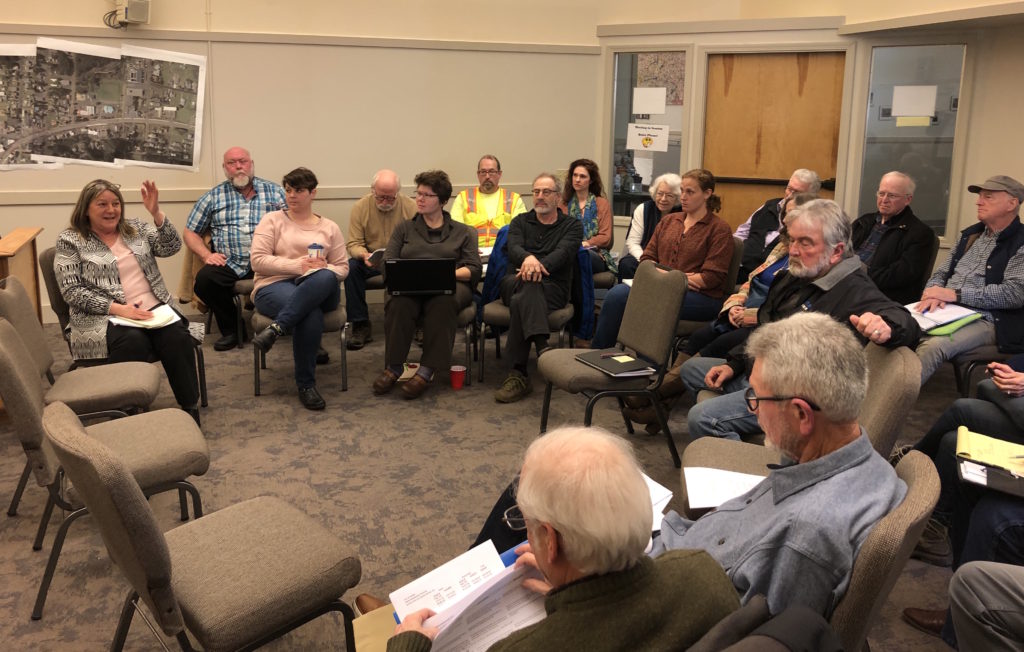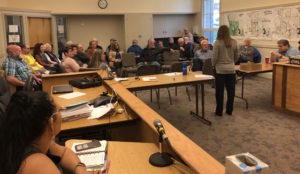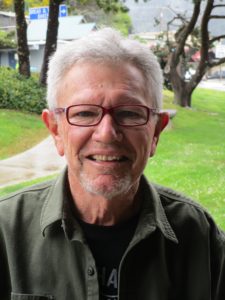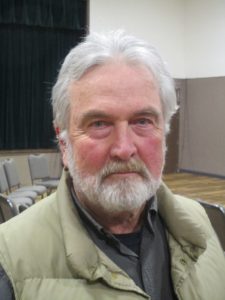
By QUINTON SMITH/YachatsNews.com
An Oregon Cascades West Council of Governments official on Wednesday defended the agency’s handling of the city of Yachats’ financial system but asked for more time to complete a transition started last July and to fix lingering problems.
“It feels like I’m in front of a firing squad,” Sue Forty told a hastily called and little publicized meeting of city staff, council members and invited members of city commissions and committees.
Forty was the head of the Albany-based agency’s finance department and helped Yachats convert to a new financial recording system last summer until being named the agency’s acting co-director late last year.
Some 25 people attended the hour-long meeting organized by City Manager Shannon Beaucaire after persistent complaints from two members of the city’s Public Works and Streets Commission, one of whom is also on the Finance Committee, and a former city financial consultant. They are worried about what they view as important errors and mistakes in city financial reports, inconsistencies between financial reports and the city’s most recent audit, and the ability to get a clear picture of the city’s financial condition.

Many members of the city’s four major commissions have also struggled with how to read and use the reports or craft reports important to their group. Beaucaire and CoG employees have met with commission members to counsel them on how to better understand the reports and the transitions involved.
Beaucaire started the meeting by saying there was talk outside City Hall “that was less than positive” about the switch to new financial software last July.
“Let’s bring the noise inside so we can address any issues,” she said.
The city has contracted with the Council of Governments to handle its finances – and convert to the new system – since the departure of finance director Judy Richter in 2018. The agency sends two of its employees to Yachats several days a week and Forty visits once a week to check in on their work.
Wednesday’s public meeting was prompted by the work of Don Groth and Bob Bennett of the city’s Public Works commission and by former city financial consultant Tom Lauritzen who asked to meet privately with Forty to go over details their concerns. Many of those details involve technical accounting procedures or confusion how the city’s last audit matches with financial reports.
On Wednesday, Forty immediately pushed back loud and hard as Groth and Lauritzen tried to work through three pages of detailed questions as the rest of the audience listened. Other issues they had hoped to bring up, but could not, included the Public Works Commission’s involvement in an ongoing water and sewer rate study – as required in recently-adopted council rules.

Forty said they should have sent her the questions in advance and eventually offered a work session “to put pen to paper to get these issues resolved.”
She said most finance system conversions for small cities take 6-7 months, but Yachats decided late last fiscal year to start its conversion in July. She said it was “kind of rushed” to do it at the end of one fiscal year and the start of another.
“The city decided it was better not to go another year under the old system,” Forty said. “I guarantee it will be easier once we get over this hump.”
But she also said “I don’t understand the misconception that computer system changes are seamless.”
Lauritzen said he simply wants to get problems fixed, and has a different view of contracting with CoG – they should be treated as vendors and held accountable for mistakes and issues rather than like employees.
“It’s not mistrust, but it’s the mechanics of the accounting,” he said. “It’s important to be accurate.”

John Purcell, chair of the Parks and Commons Commission, repeatedly defended the conversion and asked people to give the city time to work out issues despite being eight months into the conversion. Purcell said initial financial reports last summer and fall were hard to understand, but after meetings and frustrations of learning a new system, reports are now “workable.”
“It’s a work in progress … it’s going to come together,” he said.
In answer to a question near the end of the meeting Forty said while the conversion is 85 percent complete, there still are issues to clean up.
“As far as the fundamentals the system is functioning well,” she said. “As far as what people want … we’re a ways away from that.”



